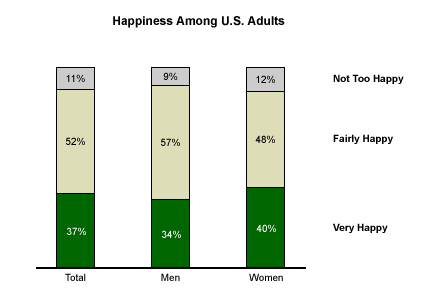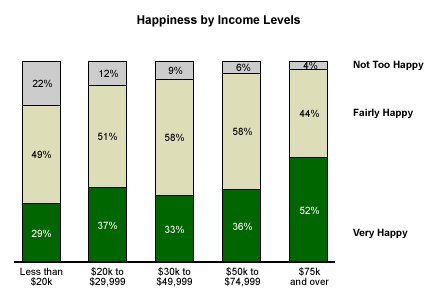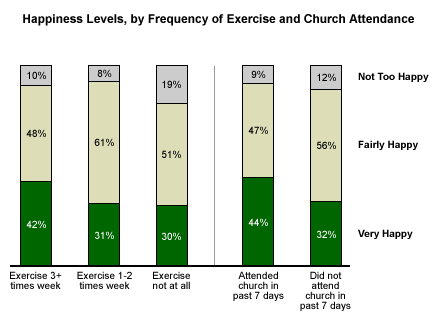For decades, most psychologists have been focused on fixing what is wrong with unhappy people. Although happiness and emotional well-being were the goals, happy people were rarely the focus of attention. The Positive Psychology movement is turning that approach on its ear. Last week's Positive Psychology Summit, hosted by Gallup in Washington, D.C., brought together researchers from around the world to share the latest research on, among other components of psychological health, happiness.
Gallup Polls suggest that overall, Americans appear to be a reasonably happy lot. A Nov. 8-11, 2001, poll* shows that 37% of Americans consider themselves to be "very happy" while 52% say they are "fairly happy." A mere 11% are "not too happy." (These levels, measured shortly after the Sept. 11 terrorist attacks, were the lowest Gallup has found in 11 polls dating back to 1956). But claiming to be very happy -- on an unqualified basis -- is substantively different than claiming to be fairly happy, which expresses at least some degree of doubt. So what can poll results tell us about how the happiest 37% tend to be different from the less happy people, and what activities might help move people from a "fairly" to "very" happy state of mind?
Byways of Happiness
More women (40%) than men (34%) report being very happy. But more women (12%) than men (9%) say they are not too happy. The largest difference lies in the middle -- more men (57%) than women (48%) report being fairly happy.

What about income? Tales of unhappy multimillionaires and movie stars provide anecdotal evidence that money isn't a cure-all for an unfulfilled life. That may be true, but Gallup data indicate that people with higher household incomes are far more likely to consider themselves to be very happy than are those with lower incomes. Among people from households earning $75,000 or more annually, 52% consider themselves to be very happy, compared to just 29% of people in households earning $20,000 or less annually. Similarly, the percentage of not too happy people increases substantially as income decreases.

The surgeon general's Report on Physical Activity and Health and other medical studies have found evidence suggesting that exercise can yield positive emotional benefits. Gallup data may lend support to those findings -- more than half of Americans reported exercising strenuously at least three times per week, and those highly active people are more likely to be very happy (42%) than less active Americans. Thirty-one percent of people who exercise one or two times per week and 30% of people who don't exercise at all say they are very happy. Conversely, people who report not exercising at all are twice as likely to report being not too happy (19%) as people who exercise strenuously at least several times throughout the week (10%).
Religious involvement also shows a clear connection to happiness. People who have attended church within the past seven days are far more likely to be very happy (44%) than are people who have not attended church during that time (32%).

While these observed differences may partly reflect results of the emotional benefits of exercise and church attendance, it is also important to consider that state of mind may also affect involvement in such activities in the first place. Unhappy people may have more difficulty regularly engaging in an exercise regimen or spiritual activities than happy people do. The most likely explanation is a combined effect: happy people may gravitate toward activities that make them happier, and unhappy people may be less likely to seek these activities, and therefore don't experience their potential emotional benefits.
*Results are based on telephone interviews with 1,005 national adults, aged 18 and older, conducted Nov. 8-11, 2001. For results based on the total sample of national adults, one can say with 95% confidence that the margin of sampling error is ±3%.